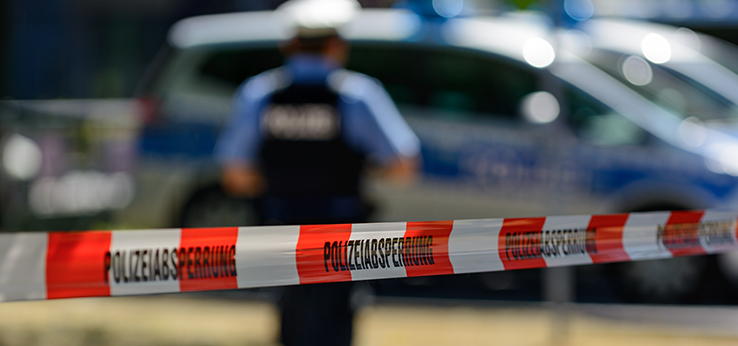Help in acute emergencies
On these pages, TH Köln provides information on urgent emergencies and disruptions. You will also find the most important information on how to behave in special emergency situations.
Jump to
- Medical emergencies
- Behavior in case of fire
- Release of hazardous substances / acute environmental damage
- How to behave in the event of threats
- Behavior in the event of a rampage
- What to do if you find suspicious objects/luggage
- What to do in the event of a bomb threat
- Technical malfunctions
- Social or psychological emergencies
- Important links
Emergency numbers
| Kategorie | Beschreibung |
|---|---|
| Police | 110 |
| Fire department / rescue service | 112 |
| Then also inform the TH Köln control room: |
- General emergencies +49 221-8275-2000 (TH internal -2000) - Technical problems +49 221-8275-2004 (TH internal -2004) - The TH Köln Control Room is staffed around the clock. |
Every emergency call must contain the following information:
| Kategorie | Beschreibung |
|---|---|
| Where? | Location / building / floor / room |
| What? | Type of incident (fire, accident, medical emergency etc.) |
| How many? | Number of people affected, any special circumstances |
| Who? | Name and telephone number of the person calling |
| Wait! | For further questions. IMPORTANT: The control center will end the call! |
Medical emergencies
general, cardiac arrest/AED, dental accident, sunstroke/heatstroke, poison emergency hotline
- The TH has trained first aiders who can be requested from the control room. Further information (overview of first aiders, locations of AEDs/defibrillators and evacuation chairs) can be found by employees in the AGU.
- For dental accidents, the TH provides so-called tooth rescue boxes. These are used to store knocked-out teeth or tooth fragments in order to preserve the viability of the cells at the tooth root and increase the chance of successful replantation. In the event of a dental accident, the tooth should be placed in the box without touching the root and then taken to the dentist. The locations can be found here.
- Specific information on heat-related illnesses can be found here.
- General note: Every first aid intervention must be documented in the first aid report form. The report form is included in every first aid kit. It may also be necessary to file an additional accident report. If necessary, ask at the study office.
- Detailed information on first aid can be found here.
- Please obtain the key for the first aid room from the porter.
First aid cases requiring emergency assistance:
- Report serious emergencies to the emergency services (112) PLUS control room (+49 221 8275-2000) and administer first aid, calling in a first responder if necessary (information via control room).
- Ensure that the emergency is handled without disruption (secure the accident site, accompany the emergency services on campus if necessary, no onlookers, no videos).
- You can find the procedure for finding an (unconscious) person here.
- If a defibrillator (AED) is required in the event of sudden cardiac arrest or life-threatening cardiac arrhythmia, you can find all locations of TH defibrillators here or contact the control room (+49 221 8245-2000). An AED is only used on persons who are unconscious and not breathing normally.
- Poison control center: +49 228 19 240 Important information to report: Type of substance, amount/concentration, time of poisoning, recognizable signs of poisoning
- General note: Every first aid intervention must be documented in the first aid report form. The report form is included in every first aid kit. It may also be necessary to file an additional accident report. If necessary, ask at the study office.
Behavior in case of fire
General, use of fire extinguishers, person on fire
- Report the fire (fire department 112 plus control room +49 221 8275-2000) and activate the fire alarm button, if available.
- Warn people in the vicinity.
- Close windows and doors. Warn people in the vicinity.
- In the event of a fire starting, attempt to extinguish it with a fire extinguisher (only if it is safe to do so). Information on how to extinguish a fire correctly can be found here (German version only) / using a CO2 extinguisher in rooms here (German version only).
- Get yourself and others to safety. Use the marked escape and rescue routes. Assist people in need of help to escape, using an evacuation chair if necessary. The locations can be found here or call the control room (-2000).
- Do not use elevators.
- Go to the assembly point and wait there for further instructions from the emergency services (overview of assembly points or on the escape and rescue route signs).
Using fire extinguishers correctly
- A quick guide can also be found here (German version only).
- Remove the safety pin (press down the button or pull the safety pin if necessary) and briefly activate the extinguisher.
- Take note of the wind direction and keep a safe distance. Do not extinguish the flames directly, but rather the burning material.
- Extinguish surface fires from front to back.
- Extinguish dripping and flowing fires from top to bottom.
- If possible, use several extinguishers at the same time – not one after the other!
- Watch out for reignition! Do not leave the scene of the fire, but keep an eye on it.
- Once used, fire extinguishers must not be returned to their place! Send them back to Team 10.3 for inspection and refilling.
Extinguishing a person on fire correctly
- Prevent the burning person from running away. Make sure that the person lies down on the ground.
- Always use a fire extinguisher or enough fresh water (minimum distance 1.5 m). Blankets or clothing are expressly not recommended.
- If possible, do not hold the extinguishing agent in the face; extinguish from the head towards the feet.
- When using CO2 fire extinguishers, be aware of the risk of suffocation and frostbite. Therefore, when extinguishing the fire, hold the extinguisher as close to the person as possible and do not leave the extinguishing jet in one place for too long. Then pull the extinguished person far away from the CO2 cloud so that there is enough oxygen for breathing again.
Release of hazardous substances / acute environmental damage
Recommended actions
- Report the incident immediately to the control room (+49 221 8275-2000) and the emergency coordinators Team 10.3 (see also left column).
- Cordon off a large area around the site. Shut down the affected systems immediately.
- Suitable emergency kits are stored at several locations.
- Further information can be found on site in the operating instructions in accordance with the Hazardous Substances Ordinance or in the safety data sheets.
- A concise explanation of the labeling of hazardous substances can be found here (German version only).
How to behave in the event of threats
Safety in the event of verbal or physical threats
- If you feel acutely threatened or harassed, call the police (110) and inform the control room (0221 8275-2000). Try to attract the attention of other people nearby and get support (if necessary, ask someone to accompany you on their cell phone).
- Create distance between yourself and the aggressor. Remain calm and de-escalate the situation, but be firm. Set clear and unambiguous boundaries without provoking the other person.
- Keep an eye on the aggressive person and do not turn your back on them.
- If weapons (knives, etc.) are used, flee.
- Document or report the incident, e.g., as a work-related accident, in order to receive professional support for trauma prevention through our accident insurance provider, Unfallkasse NRW, or, if you are a civil servant, through a cooperation partner. Further support is also available from Team 10.3 or the emergency coordination team (see box on the left).
- Help hotline for people who have experienced violence, free of charge around the clock at 116 016 (for women) and 0800 1239900 (for men).
- For cases of sexual violence, you can find further information here.
Campus Deutz:
- From noon onwards, you can request an escort from the security service via the gate (-2169). The escort will pick you up from your desired location (office, laboratory, etc.) and take you to your parked car or the nearest stop.
Behavior in the event of a rampage
Recommended actions (in rooms or outdoor areas)
- Report the threat or actual rampage immediately to the police (110) AND the control room (+49 221 8275-2000).
- Warn those nearby without putting yourself in danger.
- Describe the situation, in particular the number of perpetrators, the type of weapons, their description, and their location. Are there any dead or injured people?
- Do not attempt to contact the aggressor, even if you know them or mean well!
- Stay in your room until the building is cleared by the police or the TH crisis management team (this may take hours!).
- If possible, lock the doors or barricade yourself in, and if necessary, create a visual barrier (e.g., lower the window blinds).
- Do not stand in front of windows or doors.
- Lie down on the floor/hide under a table and remain calm.
- Mute your cell phone (keep the line free, only use it for important information to the police so as not to overload the radio network). Do not give any information to the outside world/do not post anything on social media. This can lead to panic. Onlookers who are attracted to the scene will hinder the rescue operation.
- Only flee if you are sure you will not encounter the perpetrator. DO NOT go to the designated meeting point. Let others (e.g., your team or evacuation assistants) know that you are no longer in the building.
Escape in open areas:
- Do not run together as a group/do not form a crowd and run in different directions.
- Change direction while running (e.g., zigzag).
- Seek cover at different locations along the way.
- If possible, observe the perpetrator briefly.
What to do if you find suspicious objects/luggage
Be alert to unattended objects (e.g., backpacks)
- If you find a piece of luggage without an owner, keep your distance and do not open it.
- Ask people nearby about the item and, if necessary, search for the owner in nearby rooms/toilets.
- If the situation cannot be clarified promptly, immediately inform the control room (+49 221 8275-2000) or the gatekeeper.
What to do in the event of a bomb threat
Threat by telephone or (personal) contact on site
- Every threat should be taken seriously, even if it later turns out to be a false alarm.
- Remain calm and alert your colleagues to the situation!
- Immediately inform the police (110) and the control room (+221 8275-2000).
- Keep your distance from the aggressor and do not try to resolve the situation yourself, even if you know the person personally.
- Under no circumstances should you touch any suspicious objects you find – this could be life-threatening!
- The affected area should be completely evacuated. Proceed calmly and in an orderly manner to the designated assembly points. Remain there until the situation has been clarified.
In the event of threats over the phone:
- Do not hang up, but listen and do not interrupt the aggressor. Try to inform the police and the control room (via someone else) at the same time.
- If necessary, put the call on speakerphone or let others listen in.
- Gather as much information as possible, respond to the caller, or repeat the content of the conversation.
Possible questions:
- When will the object explode?
- Where is the object located?
- What does the object (bomb, suitcase, package...) look like?
- What is your name?
- Where are you calling from?
- Why are you doing this?
- Take notes immediately so that you don't forget anything in the excitement.
Technical malfunctions
Reports to building management or Campus IT
- In the event of malfunctions, e.g., with heating, lighting, ventilation/sanitary facilities, or other malfunctions in buildings, please inform the control room (+49 221 8275-2004).
- In emergencies, ensure your own safety and that of others and secure the affected area in case of danger.
- You can also report a technical malfunction here.
- Campus IT can be reached at +49 221-8275-2323 or via the self-service portal.
Social or psychological emergencies
Rapid support services for professional or personal crises
- In the event of acute danger to the person concerned or others, call the emergency services (110 or 112) and the control room (+049 8275-2000). The emergency services will determine further steps, such as involving specialist psychiatric outpatient clinics.
- For students: The Central Student Advisory Service team also provides support in acute crises or (psycho-)social emergencies (+49 221 8275-5500).
- For employees: You can reach our occupational psychology service or specially trained mental first aiders via Team 10.3. (Dirk Köhler, -2760)
- Free, independent service offered by the City of Cologne for problems at work at BLAUFEUER or www.blaufeuer.info
- Telephone counseling: +49 800 1110111, +49 800 1110222, and 116123 (free call)
Threat of suicide
- Report any acute suicidal intent immediately to the police (110) and the control room (+49 221 8275-2000).
- Before the psychological emergency becomes acute, confidential counseling services can provide preventive support. As the person reporting the incident, you may also be indirectly affected and traumatized. Don't hesitate to contact us. TH offers professional trauma prevention services!
Important links
Web search for accident insurance consultant
- Search here for the accident insurance consultant responsible for you:
Please note: This is a translation of the original German version. This document was translated using AI (DeepL free version).
For all legal purposes the German version is binding.



